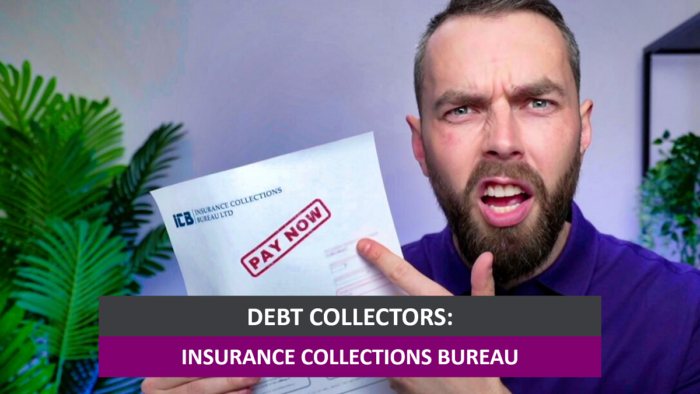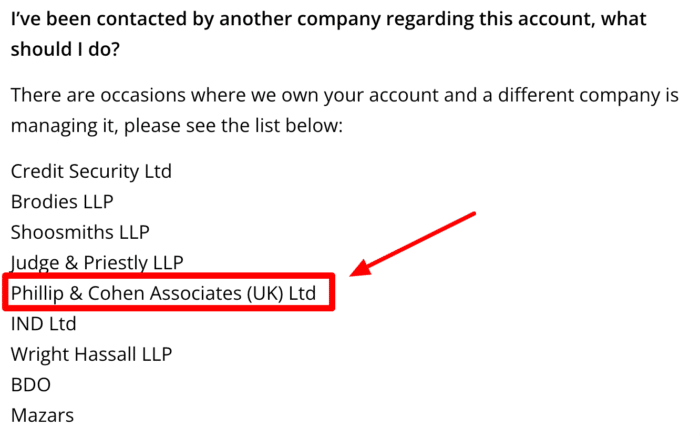ICB Debt (Insurance Collections Bureau) – Should You Pay?
For free & impartial money advice you can visit MoneyHelper. We work with The Debt Advice Service who provide information about your options. This isn’t a full fact-find, some debt solutions may not be suitable in all circumstances, ongoing fees might apply & your credit rating may be affected.

For free & impartial money advice you can visit MoneyHelper. We work with The Debt Advice Service who provide information about your options. This isn’t a full fact-find, some debt solutions may not be suitable in all circumstances, ongoing fees might apply & your credit rating may be affected.
Have you received a surprising letter about ICB debt (Insurance Collections Bureau)? You might have lots of questions. You may wonder where this debt came from and whether you must pay it. You might even be wondering if the company is real or worried about being unable to pay. If so, you’re not alone.
Each month, over 170,000 people come to our website for advice on debt problems. We understand your worries and are here to guide you. In this article you will find:
- The background of ICB Debt Collection (Insurance Collections Bureau).
- Why they might be reaching out to you.
- If it’s possible to write off some of your ICB debt.
- Steps to take when dealing with ICB Debt Collectors.
- What to do if you can’t afford to pay ICB.
Our team has experience being chased by debt collectors. We know it can be scary, as research shows 64% of UK adults find interactions with current debt collectors stressful1. Luckily, we know the best ways to handle the situation.
Here’s how to deal with ICB debt.
Why are they Getting in Touch?
Dealing with ICB Debt Collectors – Next Steps
That said, I always recommend responding to debt collectors – even just to question the debt’s validity. Remember, you have the right to request proof of the debt. They have to prove it, or they can’t charge you.
» TAKE ACTION NOW: Fill out the short debt form
Gather the necessary details
Try not to share too much information at this stage. ICB may be able to use the information that you share against you by using it as proof that you are liable for the debt.
The average unsecured debt has increased by 25% year-on-year, rising to £13,9412, which means that debt collection companies know how to get what is owed to them and have several tricks up their sleeve to cause you to make a mistake.
Keep a diary
It makes it a lot easier to keep accurate records if you communicate via post. You can request that ICB do the same.
If you have an accurate and detailed record of your communications with them, it will be very difficult for them to argue with you at a later date!
Proving the debt
Debt verification is a crucial step that, in my experience, too many people skip.
If ICB can’t prove that you, specifically, are liable for the debt, they have no legal reason to be chasing you for it.
Follow our ‘prove it’ guide with letter templates and get them to prove that you owe the money.
Chasing old debts
If it has been 6 years – or 5 years in Scotland – since you last paid towards your unsecured debts and you have not written to your creditor about your debt during this time, it is statute-barred.
This means that the debt is not enforceable. It still technically exists, and you still technically owe the money, but there is no legal way for you to be forced to pay or for the debt to be enforced.
Keep in mind that not all debts become statute-barred!
Any HMRC debts, for example, will stay enforceable for decades. Any debt that had a County Court Judgement (CCJ) attached to it during the 5 or 6-year window it will be enforceable for the duration of the CCJ.
How a debt solution could help
Some debt solutions can:
- Stop nasty calls from creditors
- Freeze interest and charges
- Reduce your monthly payments
A few debt solutions can even result in writing off some of your debt.
Here’s an example:
Situation
| Monthly income | £2,504 |
| Monthly expenses | £2,345 |
| Total debt | £32,049 |
Monthly debt repayments
| Before | £587 |
| After | £158 |
£429 reduction in monthly payments
If you want to learn what debt solutions are available to you, click the button below to get started.
What if I Can’t Afford to Pay?
If you can’t afford to repay your debts, ICB has to offer you a repayment schedule to follow. But if you feel that you can’t pay ICB debt or you are struggling with ICB repayment, you may benefit from a debt solution.
As there are several different debt solutions available in the UK, I recommend speaking to a debt charity for some free advice. Their advisors will be able to walk you through your options in detail and find the best solution for you.
Debt Management Plan (DMP)
A DMP is an informal debt solution that lets you pay off your debts via a single monthly payment.
Because it is informal, it is not legally binding so you are not tied into a DMP for a minimum number of payments.
Individual Voluntary Arrangement (IVA)
An IVA is a formal agreement between you and your creditors. You agree to pay a monthly sum that is distributed amongst your debts, and your creditors agree not to contact you during your IVA.
IVAs typically last for 5 or 6 years, and any outstanding debt is wiped off when it ends.
Keep in mind that IVAs are not suitable for everyone. You need to owe several thousand pounds to more than one creditor to be eligible. You also need to demonstrate that you have some disposable income every month.
Trust Deed
IVAs are not available in Scotland. Instead, you will need to opt for a Trust Deed.
Trust Deeds work in the same way as an IVA – you pay an agreed sum each month that is shared amongst your creditors, they can’t contact you, and any leftover debt at the end of your Trust Deed term is written off.
Debt Relief Order (DRO)
A DRO is a good option for those facing financial hardship with no assets and little income.
For 12 months, you make no payments, but your creditors freeze your interest and don’t contact you.
If your finances haven’t improved during this year, you may be able to write off your unsecured debts.
Bankruptcy
If you have debts but no realistic possibility of ever paying them off, you may need to declare bankruptcy.
Bankruptcy has an unfair stigma attached to it as it may be your only way of getting a financial fresh start. That said, it is a serious financial situation that should not be taken lightly.
Sequestration
Sequestration is the Scottish version of bankruptcy.If you have little income and no valuable assets, you may be able to apply for a minimal asset process bankruptcy (MAP). A MAP is a quicker, cheaper, and more straightforward version of sequestration, so worth considering.
Know Your Rights
Debt collectors must abide by certain rules when visiting your home/contacting you. In order to have an edge over the situation and not be taken advantage of, it’s important that you know your rights and those of the debt collectors getting in touch with you.
Please check out the following table to learn more.
| Debt Collectors Can | But They Can’t |
|---|---|
| Contact you by phone or mail. | Call you after 9pm or before 8am. |
| Conduct home visits (on rare occasions) and knock on your door. | Forbily enter your home, or stay if you ask them to leave. |
| Threaten to take you to court by suing you for payment on a debt. | Harrass you, including threats of violence, repeated calls and visits, or abusive language. |
| Negotiate a debt settlement. Tip: make sure to get this new arrangement in writing. | Visit your workplace. |
| Access your bank account, but only after a court judgment has been made. | Take anything from your home or threaten to do so. |
| Sell your debt. | Speak to other people about your debt without your permission. |
| Contact you frequently. | Keep doing so if you request that they reduce communications. |
If you suspect the debt collectors contacting you are not abiding by the rules, you can always complain.
How do I Complain About Insurance Collections Bureau?
If you think that ICB has been unreasonable or behaved inappropriately, you can make a complaint. You can also make a complaint if you feel that they have broken any of the Financial Conduct Authority’s (FCA) guidelines.
Fortunately, filing a complaint against ICB is quite straightforward!
Make your first complaint to ICB directly so that they have the chance to sort out the issue themselves. If you feel that they have not taken your complaint seriously enough or have not addressed your issue properly, you can escalate matters.
You can make any secondary complaint to the Financial Ombudsman Service (FOS). They will investigate and, if your complaint is upheld, ICB may be fined. You could even be owed compensation.
Thousands have already tackled their debt
Every day our partners, The Debt Advice Service, help people find out whether they can lower their repayments and finally tackle or write off some of their debt.

Natasha
I’d recommend this firm to anyone struggling with debt – my mind has been put to rest, all is getting sorted.
Reviews shown are for The Debt Advice Service.
Staying On Top Of Your Debts
One of the hardest parts about being in debt is that the industry isn’t at all transparent.
One common tactic used by Debt Collectors is contacting you under multiple names and addresses.
Sometimes, it’s for practical reasons, but even then it can be confusing and intimidating. So it’s important to try to keep a level head and research what’s going on.
Some of the biggest debt collectors in the UK operate under multiple names.
- Robinson Way will sometimes contact you under the name Hoist Finance.
- Cabot Financial Group recently bought Wescot Credit Services
- Credit Style communicate as both Credit Style and CST Law.
- Lowell Financial also owns Overdales and collects debts under both names.
In fact, in the case of PRA Group, they’ve been known to use multiple company names. As you can see in the image below.

If you’ve been contacted by a debt collector recently, it’s worth going through your post and emails to check that you haven’t missed anything, just in case they’ve started writing to you under a different name.


